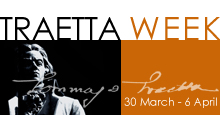On the shoulders of giants
Traetta fits in to that evolution a little later than Kaiser. Born in southern Italy in 1727, he studied in Naples and wrote his first operas for the local theatres. From there he moved north to Parma and eventually ended up in St Petersburg, where he became composer to the court of Catherine the Great. That is where he wrote Antigona, to a libretto based upon Sophocles's drama of the dysfunctional offspring of Oedipus and Jocasta. It was first performed in 1772, seven years before Traetta's death.
Traetta's achievement was to bring the two great currents in 18th-century opera together - when he was in Parma he had encountered Rameau's tragedies lyriques , and brought elements of that style, especially its use of a chorus, into the Italian opera seria tradition. That hybrid reaches its peak in Antigona, where he consistently breaks up the formalism of recitative and aria with ensemble numbers, as well as choruses, so that the music is made to serve the drama rather than vice versa.
The vocal writing for voices is dazzling - Traetta clearly had no truck with Gluck's insistence for a simpler, less decorated vocal style - and the level of invention is very high; there are very few passages that seem less than truly inspired.
The hugely informative essay that accompanies the set makes great claims for Traetta in general and for Antigona in particular, describing the opening of the second of the three acts - when Antigona cremates the body of her brother Polinices - as "realised with a pathos and lyrical feeling unsurpassed in 18th century". With Handel preceding him and Mozart to come (whose Lucio Silla was premiered just six weeks after Antigona) that may be a bit of an overstatement, but it does indicate the sheer quality of this tragedia per musica. There are strange pre-echoes of Mozart too, especially of Idomeneo, but even of the Da Ponte operas as well.
There is no doubt from the performance that Christophe Rousset believes in the work's viability too. Every bar is imprinted with authority, the orchestral playing is carefully marshalled and the cast is uniformly first rate. Maria Bayo is the tragic heroine, handling the formidable coloratura of Antigona's music with aplomb, even if she does not always project her anguish as vividly as she might. The tenor Carlo Vicenza Allemano is equally impressive as the tyrannical King Creon, and Anna Maria Panzarella's smoky mezzo is well suited to the part of Ismene, Antigona's sister.
Altogether this is an important and beautifully executed piece of musical archaeology.




 Rousset entre Venise et Naples, entretien de Nicol...
Rousset entre Venise et Naples, entretien de Nicol... All Articles
All Articles Traetta Society on Facebook
Traetta Society on Facebook

<< Home